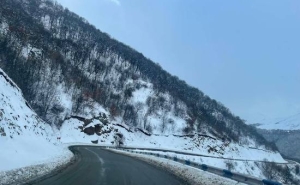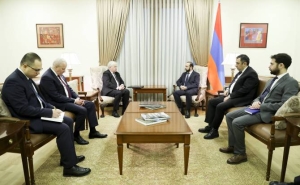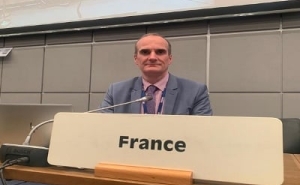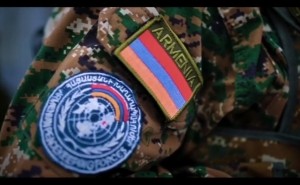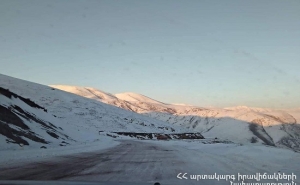 Armenia Expects from the OSCE Minsk Group Co-Chairs Not Only Statements
Armenia Expects from the OSCE Minsk Group Co-Chairs Not Only Statements

The OSCE Minsk Group co-chairs Richard Hoagland (USA), Igor Popov (Russia), Stefan Visconti (France) and Personal Representative of the OSCE Chairman-in-Office Andrzej Kasprzyk arrived in Armenia within the framework of the regional visit on June 10, and went to Artsakh on June 12. On June 19 they went to Baku. It is expected that the Co-Chairs of the OSCE Minsk Group will make a joint statement on the results of the regional visit.
Despite the fact that the regional visit is still going on, "Armedia" IAA talked with Narek Minasyan, expert at the "Insight" Analytical Center for Applied Policy and Research on the issue.
- The visit of the OSCE MG Co-chairs has not completed yet. Nevertheless, how can you assess the visit of the Co-Chairs to Armenia and Artsakh? What were the key issues?
- We can talk about the full assessment of the Co-Chairs' visit to the region after it is ended. Nevertheless, if we talk about their visit to Armenia and Artsakh, it can be noted that the expectations from this visit were not great. In addition, getting acquainted with the situation in the conflict zone, the key issue during the visit was the implementation of the agreements reached in 2016 in Vienna and St. Petersburg, which are aimed at strengthening mutual trust, in particular, the introduction of investigative mechanisms.
In fact, the Armenian sides were initially ready to implement the agreements reached, and it's not a secret for anyone that the process is impeded by the Azerbaijani side. Official Baku insists that all issues related to maintaining the ceasefire regime and the formation of an atmosphere of mutual trust are secondary, and it is necessary to focus on political negotiations for the settlement of the conflict. However, the April war proved once again that it is unrealistic to talk about political negotiations, especially about mutual concessions without introducing mechanisms aimed at strengthening the ceasefire and and creating an atmosphere of trust and confidence. In other words, how can you negotiate and expect conflict resolution if you are being shot at the same time?
Almost a year has passed since the agreements were reached in Vienna and St. Petersburg, but no significant progress has been made towards their implementation so far. The issue of increasing the number of staff of the representative of the OSCE Chairman-in-Office Andrzej Kasprzyk is regularly raised, but there is no final decision on this issue either. I would like to emphasize that we are talking only about the increase in number, and not about certain powers. It is not a secret that an increase in the number of international observers cannot have any significant impact on maintaining the ceasefire.
- Taking into account the addressed announcement of the OSCE Minsk Group Co-Chairs on May 18 and the call of Armenian Foreign Minister Edward Nalbandian in the June 10 meeting with them to take concrete measures, is it possible to say that certain changes are notices in the negotiation process?
- First of all, it should be noted that this was not the first addressed statement of the Co-Chairs. Nevertheless, such a statement is not a reason for joy, but rather a logical step, about which the Armenian sides have always stressed, and I hope this working style will become constant for the Co-Chairs.
If one of the parties to the conflict violates the ceasefire agreements (by the way, in a sense, the OSCE Minsk Group Co-Chair countries are guarantors of these agreements) and the agreements reached through mediation of the Co-Chairs, then it is more than natural that the mediators give up their principle of equalization in the statements and clearly point out to the offender. This is important from the point of view of preventing military adventures.
As for the statement of Armenian Foreign Minister Edward Nalbandian, it can be assessed as a certain toughening of the position of the Armenian side, which is very commendable. Armenia expects not only statements from the OSCE Minsk Group Co-Chairs. Despite the fact that addressed statements are important, it is obvious that they cannot completely sober Baku. Therefore, it is necessary to turn to other means. This issue, I am sure, was repeatedly voiced by the Armenian parties through diplomatic channels or behind closed doors during the talks. The fact that the minister voiced our need for "concrete steps" publicly, shows a noticeable change in our position. This is natural, since the constructiveness of the Armenian side cannot be endless and should be based on tough pragmatism.
As for the concrete actions indicated by the Minister, two types of such steps can be distinguished. First, within the framework of their mandate, the OSCE Minsk Group Co-Chair countries should take such measures, as a result of which Azerbaijan will have to mitigate its destructive position. Second, actions that the OSCE Minsk Group Co-Chairs, the US, Russia and France, can take in the framework of bilateral relations with Azerbaijan, directly and indirectly forcing it to be constructive in the context of the Karabakh conflict.
-
 17:08
17:08The regular session of the Anti-corruption Policy Council takes place in Jermuk
-
 15:05
15:05The Prime Minister sends congratulatory messages to the supreme leader of Iran and the President of Iran
-
 11:11
11:11Armenia sends earthquake aid to Turkey
-
 10:43
10:43Commemoration of the Pontiff St. Sahak Partev
-
 09:16
09:16Some roads are closed and difficult to pass in Armenia
-
 19:55
19:55Phone conversation of the Foreign Minister of Armenia with the U.S. Assistant Secretary of State for European and Eurasian Affairs
-
 18:30
18:30Prime Minister Pashinyan and President Khachaturyan meet
-
 18:20
18:20Ararat Mirzoyan with Co-Chairman of the OSCE Minsk Group of France Brice Roquefeuil
-
 17:01
17:01Humans could land on Mars within 10 years, Musk predicts
-
 16:45
16:45France, US urge 'immediate' end to Nagorno Karabakh blockade
-
 16:01
16:01Blockaded Nagorno Karabakh launches fundraiser to support quake-hit Syria
-
 15:59
15:59Earthquake death toll in Turkey rises to 18,342
-
 15:43
15:43Ararat Mirzoyan Held a Telephone Conversation with Sergey Lavrov
-
 15:06
15:06French president rules out fighter jet supplies to Ukraine in near future
-
 14:47
14:475 Day Weather Forecast in Armenia
-
 14:44
14:44President Vahagn Khachaturyan wrote a note in the book of condolences opened in the Embassy of Syria in Armenia
-
 14:20
14:20Azerbaijan’s provocations impede establishment of peace and stability – Armenian FM tells Russian Co-Chair of OSCE MG
-
 12:57
12:57France representation to OSCE: Paris calls on Azerbaijan to restore freedom of movement through Lachin corridor
-
 11:40
11:40Command of Kosovo forces highly appreciated preparation of Armenian peacekeepers
-
 10:16
10:16The United States withdrew from sanctions against Syria for six months the provision of assistance after the earthquake
day
week
month
Humidity: %
Wind: km/h


